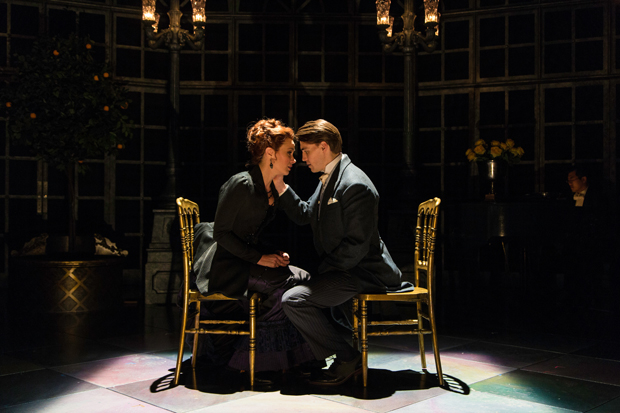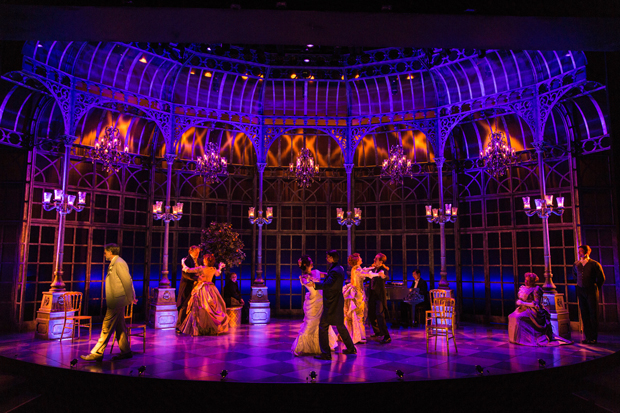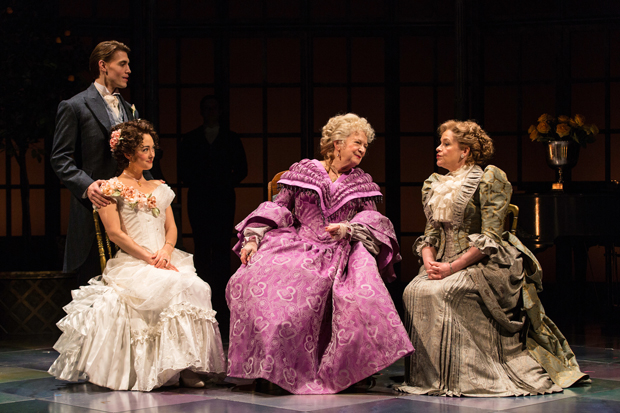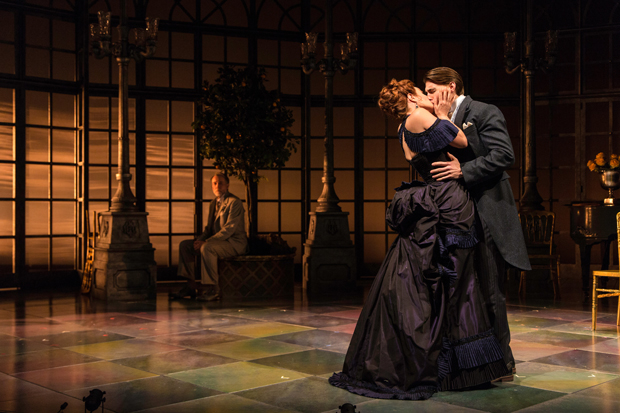Revisiting a Forbidden Love Triangle in The Age of Innocence
Playwright Douglas McGrath’s stage adaptation of Edith Wharton’s classic novel comes to the McCarter Theatre Center.

(© T. Charles Erickson)
Edith Wharton's 1920 literary masterpiece The Age of Innocence poses a great challenge for anyone brave enough to adapt it for a nonliterary medium: how to bring to urgent dramatic life a work in which the human drama lies as much, if not more, in what isn't said between characters than what is. For his 1993 film adaptation, director-screenwriter Martin Scorsese, along with co-screenwriter Jay Cocks, partially addressed that problem by having actor Joanne Woodward deliver large chunks of Wharton's prose via voiceover narration.
In his new stage adaptation currently running at McCarter Theatre Center in a coproduction with Hartford Stage (where it received its world premiere), playwright Douglas McGrath goes one step further. Instead of preserving Wharton's omniscient narration, he has an older Newland Archer (Boyd Gaines) serve as an onstage first-person narrator, one who sometimes sits on a chair on the sidelines, and at other times follows just behind his younger self (Andrew Veenstra) on John Lee Beatty's grand and glittery set, articulating his thoughts and feelings then and now.

(© T. Charles Erickson)
McGrath has thus recast The Age of Innocence as a memory play, and director Doug Hughes enhances the feeling of dreamlike nostalgia by having the action take place on one static set, with only Ben Stanton's lighting effects conveying changes in location and jumps in time. This production takes place all in Newland's own mind, with divisions of time and place collapsed. Considering the perspective from which it's told — that of a regret-filled upper-class man living among the rigid social customs of Gilded Age New York who repressed his desire for the freer-thinking Countess Ellen Olenska (Sierra Boggess) for a settled life with the plainer, more conformist May Welland (Helen Cespedes) — this shift in viewpoint had the potential to lead to a uniquely affecting take on Wharton's novel.
That potential hasn't been fully realized — in this production at least. Hughes's fluid sense of pacing often threatens to make The Age of Innocence seem soap-opera trivial: little more than a forbidden love triangle, with Wharton's sharp social critique and incisive psychologizing given short shrift. (Mark Bennett's tinkling piano score, performed onstage by Yan Li, adds to the sense of triviality.)

(© T. Charles Erickson)
The actors can't always compensate for the breezy storytelling style either. Perhaps, given a more deliberately paced approach, Veenstra and Boggess might have been able to develop the kind of romantic chemistry that would make Newland's obsession with Ellen organically convincing. Under Hughes's superficial direction, though, these talented performers never seem to fully inhabit these characters, making their dialogue — some of it taken straight from Wharton's novel — seem more arch than it ought to be. Cespedes gives the most consistent performance of the three leads as May, empathetically conveying this society girl's naivete.
As the older Newland, Gaines starts out a bit too brashly in delivering his pointed jibes at the rigid customs of his society, and slightly overdoes the emoting in the play's home stretch as he realizes the fate of unfulfilled romantic desire he has consigned himself to. As uneven as his performance is, though, Gaines comes the closest to infusing McGrath's adaptation with the alternately scabrous and pained soul that it otherwise lacks. Gaines's dryly witty way with one-liners, in particular, is enough to puncture the decorous picture-postcard surfaces of both Beatty's scenic design and Linda Cho's lavish period costumes. Similarly successful in a smaller role is Tony Ward, who, as Mr. Letterblair, Newland's boss at the law firm where he works (one of three roles Ward plays), creates a brief moment of unbearable poignancy with a monologue lamenting the stagnant state of his marriage that foreshadows the life Newland is about to live with May. Such moments suggest the devastating experience The Age of Innocence ought to have been.
Still, there is much to admire in McGrath's stage adaptation — especially his refusal to treat the novel as a sacred text. He takes quite a few liberties with Wharton's original story and dialogue, including giving Boggess — primarily known as a musical-theater performer — an opportunity to sing Stephen Foster's "Beautiful Dreamer," which becomes a kind of haunted refrain for Newland. For the most part, his additions and elisions preserve the core of the novel even as they reframe it. One can imagine a future production, with a different cast under a more contemplatively inclined director, doing this Age of Innocence the full justice it deserves.

(© T. Charles Erickson)








